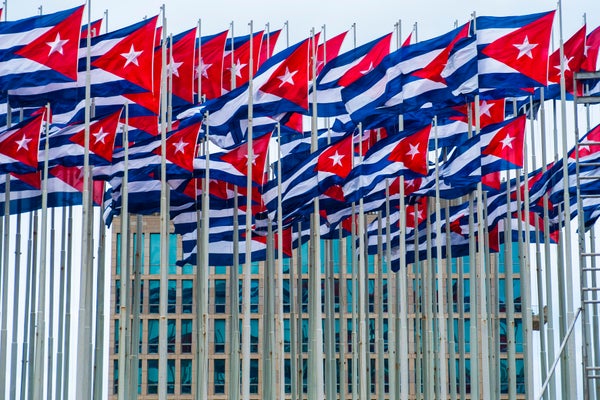In February, the House Intelligence Committee announced an investigation into spy agency handling of “Havana syndrome”—an array of health complaints first reported by U.S. diplomats and covert agents working in Cuba since late 2016. The lawmakers aren’t happy with their spies’ doubts about this mystery syndrome.
After years of speculation over the possible involvement of Russian or Chinese agents using a sonic or microwave weapon, in March 2023 the U.S. director of national intelligence reported that most U.S. intelligence agencies regarded that scenario as “very unlikely.” Instead, the intelligence community reached a consensus that the “syndrome” was “probably the result of factors that did not involve a foreign adversary, such as preexisting conditions, conventional illnesses, and environmental factors.”
These findings did not sit well with some members of the Intelligence Committee, namely representatives Mike Turner, Jason Crow and Brad Wenstrup, who had sponsored legislation in 2021 providing medical care for Havana syndrome patients and directing federal agencies to “address and mitigate these attacks.” Supporters of the bill assumed that the anomalous health incidents were targeted assaults on American citizens.
On supporting science journalism
If you're enjoying this article, consider supporting our award-winning journalism by subscribing. By purchasing a subscription you are helping to ensure the future of impactful stories about the discoveries and ideas shaping our world today.
Instead of shooting the messenger, the congressional committee should unearth the role of credulous lawmakers and the Trump administration’s State Department in cooking up a dubious syndrome that somehow merited millions in compensation while hobbling diplomatic relations with Cuba.
The annals of medicine are rife with similar examples of governments remunerating citizens for maladies that were later assessed to have been caused by an assortment of preexisting health complaints and anxiety reactions. The diagnosis of “railway spine” in Great Britain during the latter 19th century, “telephone sickness” in German switchboard operators in the early 20th century, and “repetition strain” among Australian typists in the 1980s are just three examples.
Adding further embarrassment to foreign conspiracy proponents was the release of a classified report in 2021 by a panel of experts who found that the mysterious sounds accompanying many “attacks” were the mating calls of the Indies short-tailed cricket. Other scientists had reached the same conclusion. These findings led the intelligence community to conclude that some of the symptoms were likely psychosomatic in origin, finding that “social factors” played a role in them, after victims had been primed to believe they were the targets of an imaginary weapon. Future hearings should address why several members of Congress promoted theories of foreign involvement when they had access to classified documents that concluded there was no such evidence.
The Intelligence Committee might examine how congressional hearings themselves played a role in this fiasco. American politicians have a history of turning these events into partisan spectacles. A January 2018 Senate hearing into “Havana Syndrome” chaired by Marco Rubio of the Senate Foreign Relations Committee, for example, concluded that Cuba was unequivocally involved in attacks, with the likely assistance of Russia or China. However, the hearing was devoid of testimonies from skeptical scientists and failed to produce a shred of concrete evidence to support these assertions.
Any future investigation of “Havana syndrome” should also look at how journalists peddled exotic explanations, dubious research findings and the opinions of rogue scientists while downplaying skeptical assessments by the scientific community. One claim was especially influential in promoting the attack narrative: that a 2018 study in the prestigious Journal of the American Medical Association found that a cohort of victims in Cuba suffered brain damage. Although these people did exhibit brain changes, they were relatively minor and consistent with exposure to prolonged stress. The study authors even cautioned that the anomalies were marginal and could have been caused by individual variation.
Early on, State Department doctors gravitated toward exotic hypotheses by consulting a specialist in acoustical weapons while failing to consider more mundane explanations. The State Department’s gallop ahead of an open-minded medical investigation turned the patient’s cluster of disparate symptoms into a melodramatic narrative of assault by mystery concussion weapon. This is directly relevant because “Havana syndrome” was comprised of a plethora of ambiguous complaints that are seen in doctor’s offices every day: headaches, dizziness, nausea, fatigue, memory problems, difficulty concentrating, ear pressure, and insomnia. Touted in news reports, the supposed attacks most dramatic claimed symptoms—brain damage and hearing loss—were never demonstrated in actual medical assessments.
It is noteworthy that the first victims were based in a small CIA unit in Havana and had been speculating as to the nature of mysterious sounds near their homes. Several weeks later, one of the agents experienced a headache and ear pain and became convinced that they were the victim of a sonic weapon. As word of the “attacks” spread to his work colleagues and diplomats at the embassy in Havana, staff became hyperaware of strange sounds which were associated with feeling unwell, according to a CDC report on the incidents. This is a classic setup for mass psychogenic illness which is known to follow social networks. Outbreaks commonly originate in a small, cohesive unit and spread outward, starting with people of higher status—which is exactly what happened in Cuba. Other victims were most likely redefining vague symptoms or other health conditions under a new label.
After a seven-year investigation, it is time to close the book on “Havana syndrome.” In doing so, we would do well to heed the main lesson: follow the science. If politicians continue to challenge the conclusions of their own intelligence agencies because they are not politically expedient, “Havana syndrome” may soon become synonymous with other dubious topics on the margins of science: Bigfoot, chupacabras and alien abductions.
This is an opinion and analysis article, and the views expressed by the author or authors are not necessarily those of Scientific American.
